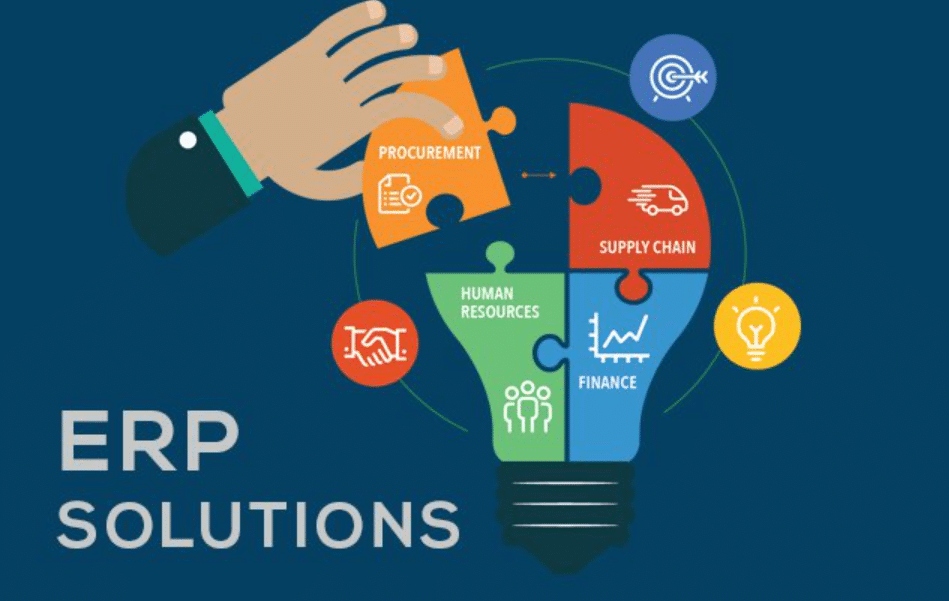ERP Solutions – In the vibrant arena of small enterprises, seamless management is the linchpin of triumph. With the march of technology, many small businesses are embracing ERP (Enterprise Resource Planning) systems to refine their operations, bolster productivity, and nurture enduring growth.
ERP Solutions
Unveiling ERP for the Small Business Domain
The Essence of ERP for Small Business
ERP for small businesses embodies bespoke software solutions crafted to synchronize and administer essential business functions on a singular platform, encompassing the spectrum from fiscal management and human capital to inventory and client relations.
The Strategic Edge for Small Enterprises
In the modern age where nimbleness and flexibility reign supreme, ERP systems bestow small businesses with the prowess to rival larger entities through enhanced efficiency, precision, and strategic insight.
The Pillars of ERP for Small Business
Unified Data Ecosystem
A quintessential advantage of ERP is the amalgamation of data into one central repository, which grants instantaneous access to information, diminishes discrepancies, and ensures uniformity across divisions.
Workflow Optimization
ERP systems excel at automating standard tasks and phasing out error-prone manual procedures. This optimization liberates employees to dedicate their efforts to more strategic and impactful tasks.
Growth-Ready Scalability
As small businesses flourish, their operational demands evolve. ERP systems are inherently scalable, adapting to the burgeoning needs of a growing enterprise without necessitating a complete system revamp.
Enhanced Analytical Insight
ERP software has potent reporting tools and analytics, providing critical insights that bolster decision-making. Small businesses can harness these data-driven revelations to uncover opportunities and navigate challenges.
The Boons of ERP Integration in Small Business
Operational Efficiency Elevated
ERP systems clearly elevate operational efficiency by automating routine tasks and providing real-time data, empowering small businesses to maximize resource utilization.
Fiscal Prudence
Operating within constrained budgets is often the norm for small businesses. ERP systems aid in fiscal prudence by curtailing manual blunders, refining inventory control, and enhancing process efficiency, thereby fortifying the financial foundation.
Customer Delight
ERP-facilitated efficient order fulfillment, inventory management, and punctual deliveries culminate in heightened customer satisfaction. Content customers are inclined to become loyal patrons and advocates for the brand.
Informed Decision-Making
The access to precise and timely data equips small business proprietors with the capability to make well-informed decisions, from pinpointing lucrative offerings to streamlining supply chain operations, all facilitated by ERP.
The Hurdles of ERP Adoption in Small Business
The Investment Conundrum
Despite the substantial long-term advantages, the initial outlay for ERP adoption poses a challenge for small businesses with finite financial resources.
Empowering Small Businesses with Tailored ERP Solutions
The seamless orchestration of operations is a critical success factor in the bustling ecosystem of small businesses. As the digital age progresses, many small enterprises are turning to ERP (Enterprise Resource Planning) systems to catalyze streamlined processes, enhanced productivity, and strategic growth.
Decoding ERP for the Small Business Sector
Tailoring ERP to Small Business Dynamics
ERP for small businesses encapsulates customized software solutions engineered to integrate and manage pivotal business activities within a cohesive platform, from financials and human resources to inventory and customer engagement.
The Strategic Lever for Small Enterprises
ERP systems equip small businesses with the tools to compete effectively, offering precision, efficiency, and the power of informed decision-making in a business landscape that prizes agility and adaptability.
Core Advantages of ERP for Small Business
Centralized Data Management
A primary advantage of ERP is the unification of data into a single, centralized system, enabling instantaneous access to information, minimizing errors, and ensuring consistency across all business functions.
Optimizing Workflows
ERP systems excel in automating routine tasks, eradicating manual processes prone to errors, and optimizing workflows, freeing staff to focus on strategic initiatives.
Adaptable Growth
As small businesses expand, their operational needs change. ERP systems are designed to be scalable, accommodating the evolving requirements of a growing business without extensive modifications.
Insightful Reporting and Analytics
ERP software comes equipped with advanced reporting tools and analytics, offering insights that aid in more intelligent decision-making. Small businesses can utilize these insights to spot opportunities and preemptively address potential issues.
The Upside of Implementing ERP in Small Business
Boosting Operational Efficiency
ERP systems significantly enhance operational efficiency by automating repetitive tasks and providing real-time data, allowing small businesses to maximize resource utilization and productivity.
Realizing Cost Savings
Small businesses often operate within tight financial constraints. ERP systems help realize cost savings by reducing manual errors, optimizing inventory management, and streamlining processes, thus positively impacting the economic health of the business.
Elevating Customer Satisfaction
Efficient order processing and inventory management, facilitated by ERP, improve customer satisfaction. Happy customers are more likely to return and recommend the business to others.
Facilitating Strategic Decisions
Access to accurate and timely data empowers small business owners to make strategic decisions. ERP systems provide the tools to identify profitable products, optimize supply chain processes, and make informed choices.
Overcoming ERP Implementation Challenges
Managing Initial Investments
The initial investment required for ERP implementation can be daunting for small businesses with limited capital. However, the long-term benefits often justify the upfront costs.
Streamlining Employee Training
Introducing a new system necessitates employee training. Small businesses may encounter resistance to change or challenges in dedicating time to comprehensive training sessions.
Simplifying Customization
ERP systems must align with a business’s unique processes. Tailoring the software to meet specific needs can be intricate and may require specialized expertise.
Laying the Groundwork for Success
Conducting a Comprehensive Needs Assessment
A thorough understanding of the business’s specific needs and objectives is essential for a successful ERP implementation. This assessment informs the selection and customization of the ERP system.
Engaging Employees
Involving employees in the implementation process, from planning to training, cultivates a sense of ownership and reduces resistance to the new system.
Selecting the Ideal Vendor
Choosing a reputable ERP vendor that offers solutions tailored for small businesses is crucial for ensuring system compatibility and receiving continuous support.
Drawing Inspiration from Success
Small Business Success with ERP
Examining real-life success stories of small businesses that have embraced ERP reveals the system’s transformative impact on operational efficiency and growth.
Gleaning Lessons from Peers
Learning from the experiences of other small businesses can provide valuable insights into common implementation challenges and effective strategies for overcoming them.
Anticipating the Future of ERP
Embracing Cloud-Based Solutions
Cloud-based ERP solutions are becoming increasingly popular, providing small businesses greater flexibility, accessibility, and cost-efficiency.
Integrating Mobile Technology
With the continuous advancement of mobile technology, ERP systems are expected to offer seamless integration with mobile devices, granting access to essential business information anytime, anywhere.
Leveraging AI and Automation
Incorporating artificial intelligence and automation into ERP systems will further augment their capabilities for small businesses, streamlining routine tasks and delivering intelligent insights.
Choosing the Perfect ERP Match
Key Considerations for Selection
When selecting an ERP system for a small business, essential factors include scalability, affordability, user-friendliness, and industry-specific functionalities.
Exploring Suitable ERP Options
Investigate popular ERP options catering to small businesses, such as QuickBooks, SAP Business One, and Odoo, and assess their features and compatibility with various industry requirements.
Implementing ERP with Precision
Strategic Planning and Assessment
A strategic approach to ERP implementation begins with a detailed assessment of the business’s needs and objectives. This ensures that the chosen ERP system is perfectly aligned with the business’s vision for growth.
ERP for Small Business: Catalyzing Success and Innovation
In the vibrant world of small enterprises, integrating ERP (Enterprise Resource Planning) systems is becoming a strategic game-changer. These systems are pivotal in harmonizing operations, propelling productivity, and fostering an environment ripe for growth and innovation.
ERP: A Tailored Approach for Small Businesses
Defining ERP’s Role
ERP for small businesses is a customized software solution suite that cohesively manages and integrates essential business functions. It encompasses various activities, from finance and HR to inventory and customer relations.
ERP’s Strategic Importance
In today’s fast-paced market, ERP systems provide small businesses with the agility and adaptability needed to stay competitive. They offer streamlined efficiency and strategic decision-making tools.
ERP’s Core Features for Small Businesses
Centralized Data Management
ERP systems centralize data into a single database, providing real-time access to information, enhancing accuracy, and ensuring consistency across all business areas.
Streamlined Operations
By automating routine tasks, ERP systems eliminate manual processes, optimize overall workflow and free up resources for strategic endeavors.
Scalable Solutions
ERP systems are designed to grow with your business, quickly adapting to new demands without requiring extensive system changes.
Advanced Reporting and Analytics
With robust reporting and analytics tools, ERP systems offer valuable insights that drive better business decisions based on data-driven strategies.
The Advantages of ERP in Small Business
Boosting Efficiency
ERP systems significantly improve operational efficiency by automating tasks and providing instant data access, allowing businesses to achieve more with fewer resources.
Cost-Effective Operations
ERP systems help small businesses save costs by reducing errors, optimizing inventory management, and streamlining processes, thus positively impacting the bottom line.
Enhancing Customer Relations
Efficient order processing and inventory management lead to improved customer satisfaction, fostering loyalty and a positive brand reputation.
Strategic Decision-Making
Accurate and timely data from ERP systems enable informed decision-making, helping businesses identify profitable avenues and optimize operations.
Overcoming Implementation Challenges
Managing Initial Costs
The initial investment in ERP can be significant, but the long-term benefits often outweigh these initial costs.
Facilitating Employee Training
Introducing a new system requires dedicated employee training to ensure smooth adoption and minimize resistance.
Navigating Customization
Customizing ERP systems to fit specific business needs can be complex, often requiring expert guidance to ensure alignment with business processes.
Implementing ERP Successfully
Comprehensive Needs Assessment
A thorough assessment of business needs and objectives is crucial for selecting and customizing the right ERP system.
Engaging Employees
Involving employees in the ERP implementation process encourages ownership and eases the transition.
Choosing the Right Partner
Selecting a reputable ERP vendor that offers solutions tailored for small businesses is essential for compatibility and support.
Learning from Success
Small Business Success Stories
Real-life examples of small businesses successfully implementing ERP systems can provide inspiration and practical insights.
Lessons from the Field
Learning from the experiences of others can help anticipate challenges and develop effective strategies for a smooth ERP implementation.
Looking to the Future
Cloud-Based ERP Solutions
Cloud-based ERP solutions are becoming increasingly popular, offering greater flexibility and cost savings.
Mobile ERP Integration
Integrating ERP with mobile technology is expected to provide even greater access and convenience.
AI and Automation in ERP
The future of ERP includes the integration of AI and automation, promising to streamline operations further and provide advanced analytical capabilities.
Selecting the Right ERP System
Key Selection Criteria
When choosing an ERP system, consider scalability, cost, ease of use, and industry-specific features.
ERP Options for Small Businesses
Evaluate ERP options that cater to small businesses, such as QuickBooks, SAP Business One, and Odoo, to find the best fit for your business needs.
The ERP Implementation Journey
Strategic Planning
Begin with a strategic plan that thoroughly assesses your business needs and clear implementation goals.
Pilot Testing
Starting with a pilot phase allows for identifying and resolving issues before a full-scale rollout.
Commitment to Continuous Improvement
Regular assessment and updates to the ERP system ensure it continues to meet the business’s evolving needs.
Measuring ERP’s Impact
Defining Success Metrics
Establish KPIs to measure the effectiveness of the ERP system, focusing on efficiency, cost savings, and customer satisfaction.
Long-Term Growth and Adaptability
Consider the long-term advantages of ERP, such as sustained growth, market adaptability, and competitive edge.
Conclusion: Unlocking New Horizons
ERP systems are unlocking new horizons for small businesses, offering a pathway to enhanced efficiency, growth, and a competitive stance in the market. As small businesses face the challenges of today’s landscape, ERP is a strategic investment for a thriving future.

